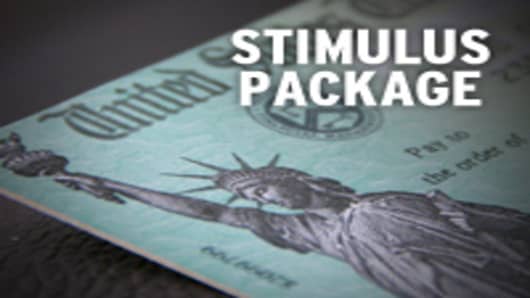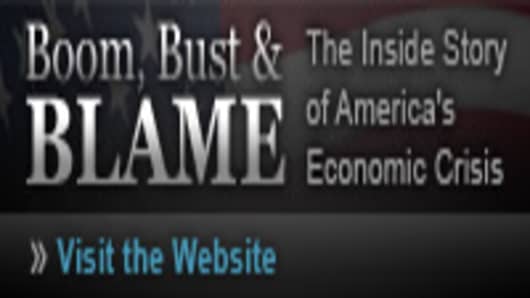A second round of economic stimulus would only steepen the government's debt problems and likely do little to boost the stock market, financial experts say.
Reacting to an idea floated Tuesday by Laura D'Andrea Tyson, part of President Obama's economic team, economists and market strategists said more stimulus is unnecessary and actually could threaten an economic recovery.
If enacted, the stimulus would come on top of the $787 billion rescue package launched in February, most of which has not reached the economy yet.
"We have enough stimulus in the pipeline. We just need to let the program roll out," said Kurt Karl, chief economist at Swiss Re. "We're on the way to recovery. It's not as strong as we all hoped. It's hard to say how strong it will be at this point, but I'd rather give it some time to wait and see."
Indeed, opposition to more stimulus is focused mainly on the impact it would have on a crushing debt load that has already sent Treasurys prices plunging and made stock investors nervous. While economists generally aren't fearful of inflation becoming a problem, another big issuance of government debt could change that forecast.
Moreover, the negative message that another stimulus would send could deter investors whose fragile collective psyche has kept the stock market locked in a range since the major indexes bounced off their March lows.
As talk escalated about another stimulus — House Majority Leader Rep. Stenny Hoyer said Congress needs to be "open" to talk of another measure — stocks fell more than 1 percent.
"Talk of a new stimulus plan is actually a confidence killer," Joseph Battipaglia, market strategist for Stifel Nicolaus, told Reuters. "That would mean we've added a trillion dollars of debt without anything to show for it."
"You'd immediately have inflation and deficit concerns that would weigh on the equity market," Karl added. "The market sees modest recovery at this point, not terribly robust but some improvement since March... I can't see that (the stimulus) would be positive."
Moreover, any gains stocks would see could be temporary.
"You might have a short-term rally. You might get a little juice out of it, but in the long term I think it would be negative, not positive," said Peter Cardillo, chief market economist at Avalon Partners in New York. "The right way to go would be to reduce corporate taxes if they were going to go for another stimulus. The infrastructure doesn't work. It's just creating a lot of debt and putting ... the dollar at risk."
There also are doubts that another stimulus would have much impact on the broader economy.
Fiscal and monetary policy moves generally have a lag of six to nine months to take effect, meaning that the economy probably would be on the road to recovery by the time the new spending actually kicked in.
"The classic thing that happens in downturns is we spend the money about the time of the upturn," Karl said. "That's unfortunately the way this package is already structured."
To be sure, some outside of Washington are hoping the government interjects more stimulus.
Among the criticisms of the first stimulus packages was that it didn't allocate enough money and was backloaded so that most of the spending didn't kick in until subsequent years.
"If a stimulus goes to the places that it needs to, which is back into the infrastructure, back into the energy, it could be time that things actually start to bubble up again," said Diane de Vries Ashley, managing partner of Zenith Capital Partners in Coral Gables, Fla.
"It's necessary. You've got to relieve people of some of the debt that they're under. You have to allow them to get mortgages, you have to let companies hire and get people employed. A stimulus will help that. It will in due course translate into something on the equity side. It's not going to be tomorrow."
The current stimulus efforts have included sending rebate checks directly to taxpayers. But that in turn has resulted in more saving rather than a jump in activity, such as buying stocks, that would boost the economy.
The savings rate, in fact, spiked to 6.9 percent in May, the highest level in 15 years.
"You reach a point where people start to see the fiscal stimulus today as a future tax liability and they end up saving it," David Rosenberg, chief economist and strategist at Gluskin Sheff, told CNBC. "We could be reaching that critical threshold right now."
And deeper economic concerns persist that go beyond the deflationary worries that led to the first stimulus.
High unemployment is expected to continue well into the future. Rosenberg pointed out during his CNBC interview that the average hours worked — a key employment metric — fell to near historic lows, indicating that companies that are keeping employees are reducing shifts.
So even when the economy turns, many of those same companies will simply move their employees back to full-time status rather than hire displaced workers.
That puts policy makers in a quandary.
"They will have to recalibrate fiscal and monetary stimulus to recognize the fact that 'temporary and targeted' stimulus will be less potent than anticipated," Mohamed El-Erian, co-Chief Investment Officer of the Pimco bond fund, wrote last week in an analysis posted on the company's Web site. "But the inclination to increase the dose of stimulus will be tempered by the fact that, as the fiscal picture deteriorates rapidly, the economy is less able to rely on future growth to counter the risk of a debt trap."
El-Erian said the combination of high debt and unemployment will be a difficult storm for the economy to weather.
"Think of this as yet another illustration of the fact that the US economy is on a bumpy journey to a new normal," he wrote. "The longer this reality is denied, the greater will be the cost to society of restoring economic stability."





